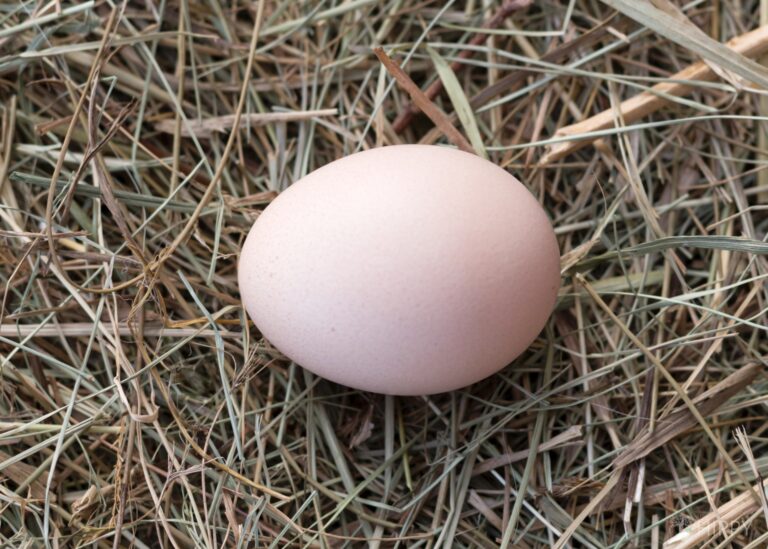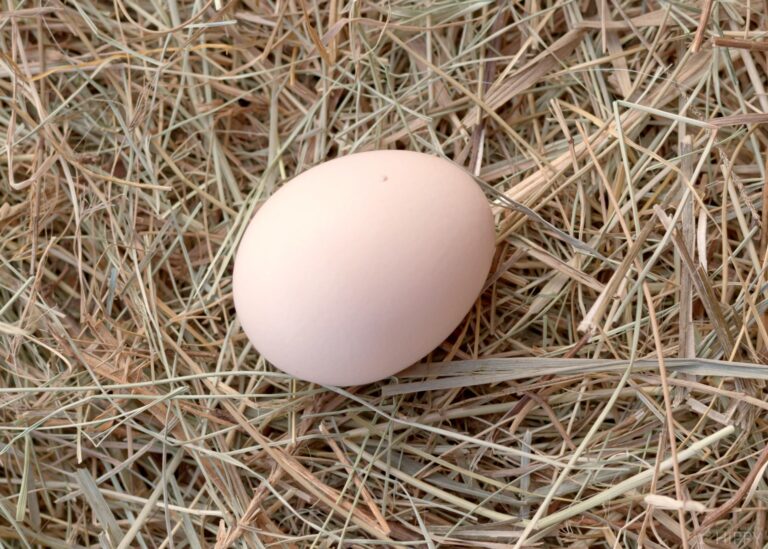If you own chickens, or buy chicken eggs fresh from a farm and especially from a smaller vendor, the concern is always there that you might get a fertilized egg. Anytime a rooster is around hens, unless he’s been caponized, you can assume that those girls are going to lay fertilized eggs.

The obvious implication is that you might go to make breakfast or prepare dessert one day and get a very ugly surprise! But let’s just say that you get fresh, but fertilized, eggs on the very day they are laid: Can you safely eat a fertilized chicken egg?
Yes, you can. Fertilized eggs are just as safe as unfertilized ones, assuming they’ve not been given a chance to develop – and that they are properly cooked. The longer a fertilized egg is left to develop the riskier it is, however.
I know the urban legends, the same as you do: someone heats up their frying pan for breakfast and cracks open an egg, to be greeted with the sight of a fully- or partially-formed chick plopping into the pan instead of a clean, sunny yolk and egg white. Ack!
Now, I’m not saying that it can’t happen, but the only way it can practically happen is if someone leaves a fertilized egg under a hen or on their counter for way, way too long before they decide to eat it- or they take it out of the incubator and crack it open!
If you follow simple procedures and use common sense, you’ll never have to worry about this. I promise that there is more you’ll want to know on this topic, so keep reading.
Can a Hen Fertilize Her Own Eggs?
No. I want to clear this up with no ambiguity: if you don’t have a rooster in the flock, or the provider of your eggs doesn’t have a rooster in the flock, you will never get a fertilized egg. The end!
I can say this with certainty, at least, that the stories of someone spontaneously getting a miraculously fertilized egg from a flock consisting of nothing but hens are actually the stuff of fiction.
No rooster, no fertilization, no exceptions: That’s one way to rule out the issue entirely.
How Far Along is Too Far Along?
The next major question we need to answer concerning fertilized eggs is how far along is too far along. As a rule of thumb, once a fertilized egg has been laid, I would never consider eating it after the day 7 mark, and I would greatly prefer to not go any further than day 4 at the most.
That’s because fertilized eggs will quickly and steadily start developing into an embryo and then an actual chick you can see in very short order. Remember, chicken eggs only take 21 days to hatch!
Your best bet is always to collect fertilized eggs the day that they are laid and then get them into cold storage immediately. This will halt development entirely and with certainty…
Are Fertilized Chicken Eggs Dangerous to Eat?
No. Again, this assumes that you handle and prepare it properly. There’s nothing inherently different or wrong about fertilized eggs in terms of food safety, nutrition, or any other potential problems.
Are Fertilized Chicken Eggs More Nutritious?
No, they are not. This is another urban legend that is shockingly persistent: Fertilized chicken eggs have all of the same basic organic components, if you will, that give unfertilized eggs their nutritional profile.
How Do These Eggs Taste?
Fertilized eggs taste just like unfertilized eggs assuming that they have not gone very far along in terms of development.
This is another persistent rumor that has led to some folks recommending fertilized eggs for better taste, texture, quality, and so forth. I’ve had plenty of both, including from the same chicken, and I can tell you that those rumors are just not true.
What’s the Best Way to Handle and Store Fertilized Eggs for Eating?
Handling and storing fresh eggs is always essential for quality and food safety, but you’ve got added considerations if you’re dealing with fertilized ones…
For starters, it is imperative that you collect fertilized eggs as quickly as possible. A few days can make a big difference in terms of internal development!
But whereas you could collect unfertilized eggs and leave them on the counter for a few days prior to using them without any worry, it’s possible that the warm conditions of your home might be enough to start or even sustain development of the embryo inside the shell.
Accordingly, you want to collect those fertilized eggs right away and leave them on the counter only as long as it takes for them to cool down to room temperature before popping them in the fridge: Only once they’ve been refrigerated will the development of the embryo inside be truly halted.
Can a Fertilized Egg Still Develop in the Refrigerator?
No. Fertilized eggs must be kept a bare minimum of 68° F for embryonic development to occur. Below that temperature, the embryo stops developing and goes dormant. Much warmer is better, but eggs can be kept below incubator temps and still grow!
Accordingly, fertilized eggs left on a countertop in a warm home are still going to incubate! That’s why you have to pop them in the fridge post-collection as soon as they cool down to room temp.
A quick but relevant story: I have a neighbor who once left fertilized eggs on her counter for too long, about a week, and they were already a few days old before they were collected.
When she cracked open one of the eggs to make some breakfast, she saw a distinctly unpleasant patch of tissue inside- though it was far from a genuinely developed chick.
Needless to say, it was unsettling and the gross-out factor was very high! Collect and chill fertilized eggs as quickly as possible to avoid the same fate.

How Can You Check a “Questionable Egg?”
If you are unsure about the development of an egg, you can check it yourself by candling it, and if you know what to look for you’ll be able to tell if it is way too far gone or just on the verge. However, my advice is always to simply discard fertilized eggs that you have real doubts about.
Even if an egg has been fertilized, there will be no significant signs of development inside the yolk for the first five or six days, so if you collect it even two or three days after it’s been laid, and probably put it in the refrigerator, it will appear and taste completely normal.
But, do be sure that you refrigerate it to stop development! Leaving it in a warm environment means it could keep growing as detailed above.
Obviously, whether the egg is still viable or not, you should never even consider cracking it open if it is no longer translucent; that means there is a mostly-developed chick inside! You have been warned.
Tim is a farm boy with vast experience on homesteads, and with survival and prepping. He lives a self-reliant lifestyle along with his aging mother in a quiet and very conservative little town in Ohio. He teaches folks about security, prepping and self-sufficiency not just through his witty writing, but also in person.
Find out more about Tim and the rest of the crew here.
